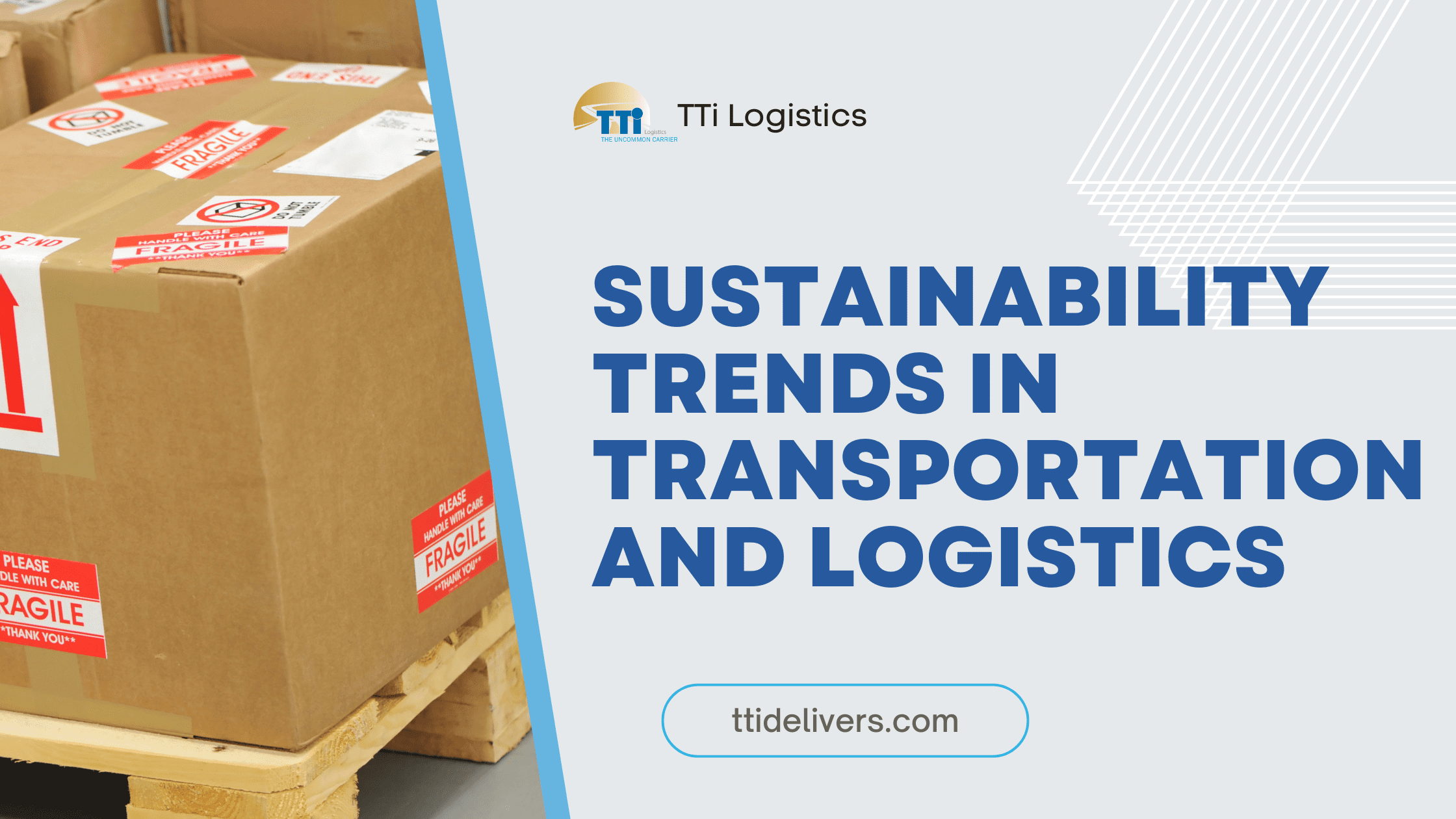Why Sustainability Matters in Transportation and Logistics
Sustainability has emerged as a critical focus for businesses across various sectors, with the transportation and logistics industry standing at the forefront of this movement. As companies prepare for end-of-year reports and set ambitious sustainability goals, there is an increasing interest in how logistics can implement green practices to minimize environmental impact. The logistics industry faces unique challenges, including a heavy reliance on fossil fuels, extensive transportation networks, and the need for efficient resource management. However, these challenges also present significant opportunities for innovation and improvement.
This blog post delves into the latest trends in sustainable transportation and logistics, examining green practices, eco-friendly innovations, and strategies companies are employing to meet their environmental goals. By understanding these trends, businesses can position themselves as leaders in sustainability while enhancing operational efficiency and profitability.
Understanding Sustainability in Logistics
Definition of Sustainability in the Logistics Context
Sustainability in logistics refers to the integration of environmentally friendly practices throughout the supply chain, from sourcing raw materials to delivering finished products to consumers. This holistic approach aims to reduce the carbon footprint, conserve resources, and promote ethical sourcing and waste reduction. Key areas of focus include energy consumption, waste management, emissions reduction, and sustainable packaging.
Importance of Sustainability for Businesses and the Environment
The logistics sector is one of the largest contributors to global greenhouse gas emissions, accounting for a significant portion of the carbon footprint associated with consumer goods. As environmental concerns gain traction, businesses are increasingly held accountable for their sustainability practices.
Adopting sustainable practices not only helps combat climate change but also offers several benefits:
- Enhanced Brand Reputation: Companies committed to sustainability often enjoy improved public perception and customer loyalty.
- Cost Savings: Efficient resource management and waste reduction lead to significant cost savings over time.
- Regulatory Compliance: As governments worldwide introduce stricter environmental regulations, staying ahead of compliance requirements can mitigate risks and reduce penalties.
Current Trends in Sustainable Transportation and Logistics
1. Green Logistics Practices
Green logistics emphasizes reducing the environmental impact of logistics operations. This encompasses a variety of strategies designed to optimize logistics processes while minimizing resource consumption and emissions.
- Optimizing Transportation Routes: Advanced route planning software helps logistics companies determine the most efficient delivery routes, reducing fuel consumption and transit times.
- Energy-Efficient Warehousing Solutions: Many warehouses are transitioning to energy-efficient lighting, heating, and cooling systems, as well as incorporating renewable energy sources such as solar panels.
- Sustainable Packaging Materials: The shift toward eco-friendly packaging options, such as biodegradable materials or minimalistic designs, is gaining momentum. Companies are reassessing their packaging strategies to reduce waste and environmental impact.
Benefits of Implementing Green Logistics Practices:
- Cost Savings: Reducing fuel usage and energy consumption leads to significant savings.
- Enhanced Brand Image: Companies that adopt green logistics practices often attract environmentally conscious consumers.
- Regulatory Compliance: By adhering to sustainable practices, businesses can more easily comply with emerging regulations aimed at reducing environmental impact.
2. Eco-Friendly Innovations
Innovative technologies are transforming how logistics companies approach sustainability. These advancements facilitate the implementation of eco-friendly practices and enhance overall operational efficiency.
- Electric Vehicles (EVs): The adoption of electric trucks and delivery vehicles is on the rise, helping to reduce emissions in urban areas and improve air quality.
- Alternative Fuel Sources: Many logistics providers are exploring alternative fuels, such as biodiesel and hydrogen, to power their fleets. These options often produce fewer emissions than traditional diesel fuel.
- Automated Delivery Systems: The rise of drones and autonomous vehicles is revolutionizing last-mile delivery, reducing the carbon footprint associated with traditional delivery methods.
3. Sustainable Supply Chain Practices
Sustainability must extend beyond transportation to encompass the entire supply chain. This holistic approach considers sustainability at every stage, from raw material sourcing to end-of-life product disposal.
- Ethical Sourcing: Companies are increasingly prioritizing suppliers who adhere to sustainable practices, ensuring that materials are sourced responsibly and ethically.
- Waste Reduction Initiatives: Implementing circular economy principles helps logistics providers minimize waste through recycling and repurposing materials.
- Supplier Collaboration: Strong partnerships with suppliers can enhance sustainability efforts. By working together, companies can share best practices and develop innovative solutions that benefit the entire supply chain.
4. Regulatory Pressures and Compliance
As environmental concerns grow, governments worldwide are implementing stricter regulations aimed at reducing the carbon footprint of logistics operations. Compliance with these regulations is essential for companies to operate legally and maintain their reputations.
- Emission Standards: Many countries are introducing regulations that require logistics companies to reduce emissions from their fleets. Compliance often necessitates investing in cleaner technologies and practices.
- Waste Management Regulations: Proper waste management and disposal practices are increasingly regulated, compelling logistics providers to adopt more sustainable waste management strategies.
Best Practices for Implementing Sustainability in Logistics
1. Setting Clear Goals and Metrics
For logistics companies, establishing clear sustainability goals is crucial. These goals should be measurable and aligned with the broader objectives of the organization.
- Importance of Defining Sustainability Goals: Setting specific, achievable goals enables companies to track progress and identify areas for improvement.
- Key Performance Indicators (KPIs): Metrics such as carbon emissions, energy consumption, and waste reduction should be monitored regularly to assess the effectiveness of sustainability initiatives.
2. Collaborating with Partners
Collaboration is key to achieving sustainability goals. Logistics providers should work closely with suppliers, customers, and other stakeholders to foster a culture of sustainability throughout the supply chain.
- Importance of Collaboration with Suppliers and Customers: Engaging partners in sustainability initiatives enhances transparency and accountability.
- Strategies for Fostering Partnerships Focused on Sustainability: Regular communication and shared goals can lead to more effective collaboration and innovation.
3. Investing in Training and Education
Employee training is essential for successfully implementing sustainable practices. Companies must equip their workforce with the knowledge and skills needed to prioritize sustainability in their daily operations.
- Importance of Employee Training on Sustainable Practices: Well-trained employees are more likely to embrace sustainability initiatives and contribute to their success.
- Examples of Training Programs and Initiatives: Companies can implement workshops, seminars, and online courses to educate employees about sustainability practices and technologies.
Future Outlook for Sustainability in Logistics
The future of sustainability in logistics looks promising, with emerging trends and technologies poised to shape the industry.
- Emerging Trends: As consumers demand greater accountability, companies will increasingly prioritize transparency in their sustainability efforts. Blockchain technology, for instance, can provide consumers with verifiable information about the sustainability of products.
- Predictions for the Future of Sustainable Logistics: The logistics industry is likely to see further advancements in electric and autonomous vehicles, increased reliance on renewable energy sources, and enhanced data analytics to drive sustainability efforts.
Driving Toward a Sustainable Future in Logistics
Sustainability is no longer a peripheral concern for logistics companies; it is central to their operations and future viability. By embracing sustainable practices and technologies, companies can enhance their brand reputation, improve efficiency, and meet the growing demands of environmentally conscious consumers. As businesses prepare for year-end sustainability goals, now is the time to invest in strategies that prioritize sustainability in transportation and logistics.
By staying informed about the latest trends and innovations, companies can position themselves at the forefront of the sustainability movement, ensuring long-term success in an increasingly eco-conscious world. The time to act is now—adopting sustainable practices not only benefits the environment but also creates a competitive advantage in the marketplace.







